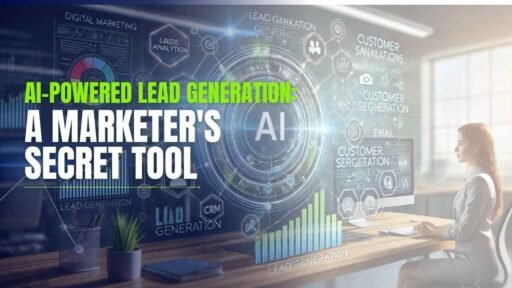Over the years the marketing arena has undergone several transformations, the role of which was propelled majorly by technology. Of these advanced forms, the one that has found its way into today’s lead generation is Artificial Intelligence (AI). Thus, AI has an opportunity to increase a company’s efficiency in finding potential customers and enhance the overall marketing strategies.
We will discuss how AI lead generation works, its advantages, and why companies need it to improve their outcomes.
How AI help in Lead Generation?
AI technology has also improved several aspects of lead generation as the process is now more efficient than before. Routine works including data input, research on prospects, and timing of follow-ups may be attended by AI-based tools leaving marketers to strategize. AI enriches historical data, which allows prioritizing an effort on leads that are likely to convert. AI systems work in real time thereby allowing marketers to refine the campaigns depending on the current trends in data processing.
Below are some key ways AI contributes to enhanced lead generation:
Predictive Analytics
- Lead scoring, as analyzed by AI, takes a look at prior data so that potential prospects with the likelihood of conversion could be prioritized.
Real-Time Data Processing
- Computation understanding processes data in real-time and enables marketers to modify their campaigns based on continually emerging trends quickly.
When selecting AI tools for lead generation, look for these essential features:
Advanced customer segmentation and the evolution of the Internet as a communication media. Segmenting all the potential customers by their behavior, likeliness, and demographic characteristics to better reach out to them. Employing Artificial Intelligence’s power to personalize messages sent to prospects increases engagement levels. It incorporates seamless integration with other existing CRM systems to avoid data discrepancy. Updating leads based on cleaning and enhancing the leads database to make sure that the information collected is correct and as up-to-date as possible.ion, look for these essential features:
Advanced Customer Segmentation
- Grouping potential customers based on behavior, preferences, and demographics for more targeted marketing.
Personalized Outreach
- Using AI to ensure that every message sent to the prospective clients was unique therefore increasing the engagement rates.
CRM Integration
- Seamless synchronization with existing customer relationship management (CRM) systems to maintain data consistency.
Data Enrichment
- Cleaning and enhancing datasets to ensure the accuracy and relevance of lead information.
Advantages of AI in Lead Conversion
AI algorithms filter out fake and potentially non-interested leads, this means marketing teams are selling to those with great potential. Automation helps to minimize work performed manually while at the same time lowering operational expenses and accelerating the lead qualification process. Interaction is made personal and potential consumers feel valued and understood because of artificial intelligence. The availability of records indicates that AI systems can effectively address large databases, which can be adopted in various organizations to improve their lead generation efforts:
Higher Lead Quality
AI algorithms filter out unqualified leads, ensuring that marketing teams focus on prospects with the highest potential.
Cost and Time Efficiency
- Automation reduces the need for manual work, cutting operational costs and speeding up the lead qualification process.
Enhanced Customer Experience
- AI enables personalized interactions, making potential customers feel valued and understood.
Scalability
- AI systems are designed to use large sets of data and will be very useful to businesses of all sizes.
Current and future issues of AI in lead generation
Despite the advantages of using AI in lead generation, it is crucial to know that this approach has also its disadvantages. Maintaining the legal requirements for the protection of data and the ethical use of customers’ data is important. Finally, AI systems require minimal human interaction but depend on high-quality data for their operation. powered lead generation offers numerous benefits, but it is not without challenges:
Data Privacy Concerns
- Adhering to data protection regulations and ensuring ethical use of customer information is critical.
Dependence on Data Quality
- The findings were That to enable AI systems to run effectively, high-quality data is required. Poor or incomplete data can lead to inaccurate results.
Learning Curve
- Teams may require training to use AI tools efficiently, which can initially slow down implementation.
Use of AI in Lead Generation – Practical Implementation
Identifying sales leads through online conversations to enable automated qualification of the leads. The listing leads according to the likelihood that they will transform into a potential buyer, to enable prioritization of follow-ups. Expert systems and algorithms that develop and send social optimization emails.s aspects of lead generation to improve outcomes:
Chatbots Powered by AI
- Simplifying leads qualification mechanisms by communicating with the prospects through full-fledged and informative dialogues.
Predictive Lead Scoring
- Ranking sales leads by how likely they are to be converted for the next course of action.
Automated Email Campaigns
- Creating and sending personalized emails optimized for engagement using AI algorithms.
How to Implement AI-Powered Lead Generation in Your Business?
Lead generation is a key process in business and the incorporation of artificial intelligence technology can bring reform into your business. Consider and choose proper AI tools that will be suitable for your enterprise’s goals and missions. Grate AI technology into your lead generation strategy, follow these steps:
Choose the Right Tools
- Consult which tools better fit your business needs and objectives and select the adequate AI tools appropriately.
Integrate with Existing Systems
- Ensure that AI solutions work seamlessly with your current marketing and CRM platforms.
Train Your Team
- Provide adequate training to your team members to ensure they can leverage the technology effectively.
Artificial Intelligence in the Future and Trend of Lead Generation
As AI technology continues to evolve, new trends are emerging that could further transform lead generation:
Machine Learning in Marketing Content: How to Build Generative AI. Developing marketing content in consideration to target consumer preferences and trends. Improving customer information and the relevancy of leads through improvements in artificial intelligence computations. Ensuring that information, which is enhanced and supplemented by AI, will reach SMBs on an equal basis in competitive markets.rm lead generation:
Generative AI for Marketing Content
- Creating tailored marketing materials based on audience preferences and behaviors.
Improved Predictive Modeling
- Enhancing the accuracy of lead scoring and customer insights through advanced algorithms.
Increased Adoption by SMEs
- Having provided increased availability of AI for SMEs, the playing field is leveled and becomes more balanced.
Conclusion Lead Generation
AI lead generation is another beautiful concept that is quite likely to hold a low-hanging fruit for businesses as it in a way formulates a unique way to produce better outcomes of marketing strategies. The effectiveness of AI in automating labor-intensive mundane chores, presenting forecast data, and optimizing the engagement with the customer allows the marketer to concentrate largely on the more central option-making.
Just like has been observed over the recent past, it will be increasingly important to be abreast with the advances in AI and its impact on business, especially as businesses incorporate this technology into their operations. The use of AI in lead generation can act as the key to successful marketing in the future where the market environment continues to change.
FAQs
1. What is meant by AI lead generation?
AI product selling entails applying intelligent machine tools in assessing and ranking possible clients better than conventional approaches.
2. That is the question: How will AI enhance lead quality?
AI increases the quality of leads due to the evaluation of such data to predict potential clients and exclude low-quality leads.
3. Is the use of intelligent tools costly to deploy?
The general price tag of AI tools does exist but most of the solutions are affordable for everyone including small to medium businesses.
4. Another question I wonder is whether these tools can connect to other systems in a company.
Yes, most AI tools can easily be incorporated with CRM and other marketing platforms.
5. What are the constraints of AI when it comes to generating leads?
Challenges that are associated with AI include; Data privacy issues, Data quality issues, and training for the AI tools.
6. Is there an applicability of AI in every kind of business?
Yes, AI lead generation can be useful for businesses regardless of the industry they belong to as long as the data is accessible and the would-be AI lead generation system can be integrated into their current system.






